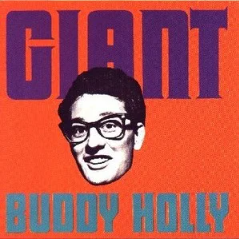This article needs additional citations for verification .(March 2017) |
| Giant | ||||
|---|---|---|---|---|
 | ||||
| Compilation album by | ||||
| Released | January 1969 | |||
| Recorded | 1956–1959 and 1963 | |||
| Studio | Norman Petty Recording Studios (Clovis, New Mexico) | |||
| Genre | ||||
| Length | 21:04 | |||
| Label | Coral | |||
| Producer | Norman Petty | |||
| Buddy Holly chronology | ||||
| ||||
| Review scores | |
|---|---|
| Source | Rating |
| AllMusic | |
Giant is a compilation album by American rock and roll singer Buddy Holly. The album was released as an LP record in stereo format in January 1969 (see 1969 in music).
Contents
Giant was Buddy Holly's eighth posthumously released album and the fifth album to feature previously unreleased material. The original recordings were overdubbed by the Fireballs in 1963.
The album was released on CD for the first time in 1993 by Castle Communications in the UK. [2]